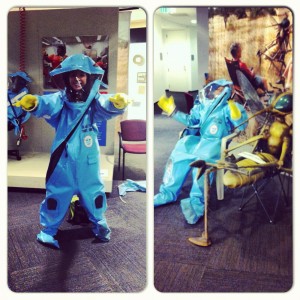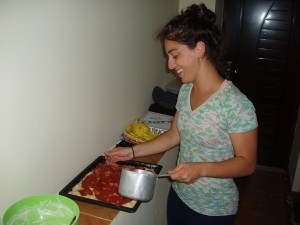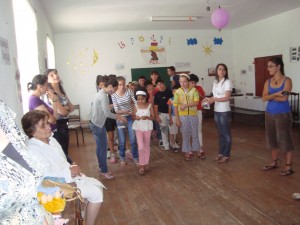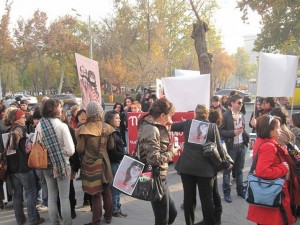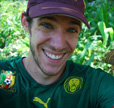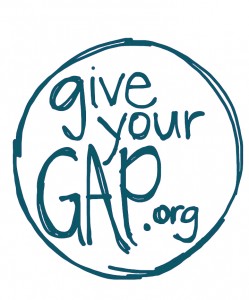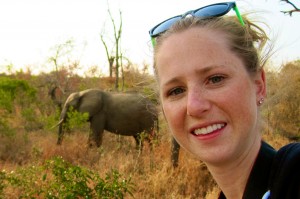
Me and an elephant
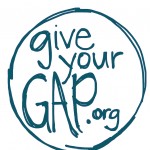 Name: Allie H.
Name: Allie H.
University: UCSD
Major: Biochemistry and Cell Biology
Type of Work: Medical/Public Health
Region: Africa
Length of stay: 3-6 months
Tell us about the nonprofit/social business you work for:
I am working in the capital city of Swaziland, a tiny kingdom located inside of South Africa. Primarily, I work with the Baylor International Pediatric AIDS Initiative (BIPAI) as a research volunteer in the BCM Clinical Centre of Excellence pediatric HIV clinic in Mbabane. At the clinic I am engaged in a variety of small and large scale clinical research projects (mostly retrospective) directed towards supporting policy changes related to HIV care and treatment in Swaziland.
How did you find your position?
One of the Baylor AIDS Corps doctors is a close family friend. I contacted him when I decided to take a year off between undergrad and graduate school and he was more than happy for me to have me travel to Swaziland and help out at the clinic.
What’s your typical day like?
My work schedule varies greatly depending on the day because I am involved in a number of projects. Everyday brings a different set of responsiblities and tasks for me! I love it because my work is unpredictable, challenging and constantly changing. Some projects are long term while others have been short and intensive for a few weeks at a time. I typically work 6-8 hours a day and the three organizations are conveniently located on the same street in Mbabane so it’s easy for me to walk back and forth between them.
What kind of people do you work with?
I work with all kinds of individuals and I love it! At the clinic we have international doctors, local Swazi nurses, pharmacists, social workers etc, as well as volunteers of all ages from all over the world. I am on the younger side of the age spectrum here but the community is perpetually changing so the age make-up changes almost weekly. People from all backgrounds live and work in Mbabane such as health professionals, consultants, businessmen and women, journalists, etc.
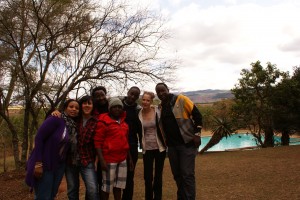
Me and my Rwandan Family + Marta (the Spanish girl I live with also)
What are your living accommodations?
When I initially arrived I stayed with my family friends but quickly moved into a one bedroom apartment attached to a house owned by an amazing Rwandan woman. I have definitely become part of the family and eat breakfast and dinner with them each day and spend weekends at BBQs (or braais in SiSwati) with their family friends. My apartment is fully furnished with a full kitchen and bathroom and I have wireless internet access as well. There are very few if any “apartments” in Swaziland like there are in the US; all of my friends here live in houses or rent rooms from families.
What do you do in your free time?
Lots! I’m fairly certain that my social calendar in Africa is twice as busy as it ever was in the States. I am blessed to have a wonderful expatriate community here in Swaziland full of adventurous and brilliant individuals. Each week we play ultimate frisbee with a group of local Swazi teens and have weekly themed dinners (mexican food night is my favorite!). I have been taking portuguese lessons twice a week, running in the local game parks on the weekends and hiking all around Swaziland. We take weekend trips to the beaches in Mozambique and South Africa whenever we get the chance or travel further within southern Africa on long weekends. Swaziland also has ridiculous events such as the annual goat and rat races and Slojo half marathon which I have participated in. Never a dull moment in the Swaz!

Table Mountain, Robben Island
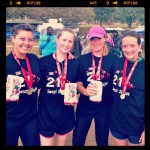
Allie and some of her girlfriends after running the half marathon
Share a favorite memory or story from your experience!
Daily life in Africa is an adventure in itself and its hard to choose just one experience. I’d say one of the most memorable, and quintessentially African, moments is when my friends and I ran into a hippo sleeping on the street corner as we were walking back from dinner!
What inspired you to do this kind of work? If you are taking a gap year, what motivated you to do that?
My gap year was motivated by the pursuit to discover my future career path. I knew I wanted to study public health in graduate school but I wanted to be certain that it was for me before dedicating two years of my life to a program. After my time in Africa I am 100% certain that this line of work is for me and the first-hand experience I have gained from working in a resource-limited setting is irreplaceable.
How are you financing your time?
I am financed by own personal savings and some contributions from my lovely family. I had a difficult time finding a paid internship or volunteer position that was exactly what I wanted. Although its tough to finance it all on my own, the freedom I have to create and shape my own experience abroad is pretty much priceless. I have made my experience into exactly what I wanted it to be.
What kind of special skills do you need to do your job?
None
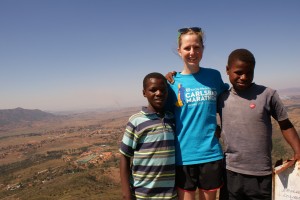
Menzie, Mduduzi and I at the top of a mountain in Swaz (Menzie and Mduduzi are two of the Swazi teens I play frisbee with each week and love dearly)
Do you feel like you are making a positive, critical impact on the global community?
On a personal/individual level I am making an impact on the daily lives of the Swazi teens I work and play with. My friends and I provide them with a critical support system they are lacking at home in most cases. The work I am doing at the clinic and other NGOs definitely has the ability to have an impact at the national level by informing organizations and health care providers of better ways to direct care and resources to patients. Most of my projects are still works in progress but the eventual outcomes will be influential to patient care and treatment in Swaziland.
What have you learned about the nonprofit and social business world in your experience?
One of the most important things I have learned is that you must work within the system, whatever that system may be-social, political etc. I spent quite a bit of time going about my work as if I was still in America and found myself frustrated day to day. Eventually I realized that I needed to work within the bureaucratic systems in place, thereby saving myself from a bit of frustration and grief. To the same extent, it is equally important for organizations to work on capacity building within the communities they operate in to establish sustainable programs.Do you think you make a unique contribution to your organization as a young person? Is your perspective or approach different from others?
Do you think you make a unique contribution to your organization as a young person? Is your perspective or approach different from others?
Yes. I have found that many of the employees working with NGOs in Swaziland are quite young and I think the vibrant personalities and fresh ideas provided by our generation contribute positively to the programs that are designed and implemented here. The dynamic between the younger and older employees is very valuable because it combines new ideas with wisdom and experience.
How do you see this experience fitting into your long-term goals?
My time here has solidified my passion for global public health work. I have had opportunities to experience or observe many aspects of the field that I did not know existed previously and I am confident that having that knowledge will benefit my studies in the future. My main goal has not changed but I have a more focused objective for the future.
What’s next? 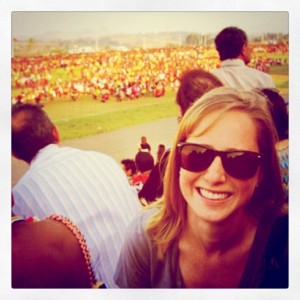
I will be volunteering in Sao Paulo, Brazil for 6 months beginning in January before starting graduate school next fall to pursue a Master in Public Health degree! After graduate school I plan to continue public health work abroad.
What is one thing you wish you knew before you came to your position?
The amount of communication skills it would require. A lot of my work involves communicating ideas clearly and succintly to other organizations and government programs. I have definitely developed my communication skills greatly over the past few months.
Do you have any advice for prospective gap-givers?
Taking a gap year is a wonderful way to figure out exactly what you want to do and provide you with a more focused perspective for future endeavors. I highly recommend taking some time off to give back to the world and learn; learn about yourself, your ambitions, the world, opportunities, other cultures, everything! All of your experiences will benefit you in the future.
Are you blogging about your work or travel? How can we stay in touch?
Blogging @ alliebhughey.blogspot.com
Would you be willing to take questions from potential Gappers?
Yes

